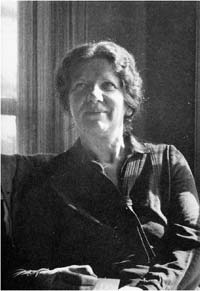|
|
Online Texts for Craig White's Literature Courses
|
|
|
Excerpt from Anzia Yezierska Bread Givers (novel, 1925) Example of Immigrant Narrative |
Anzia Yezierska, 1880-1970 |
Instructor's notes: Anzia Yezierska, born to a Jewish family on the Polish-Russian frontier in the late 1800s, came as a child to the United States. After growing up in Jewish neighborhoods of New York City, she became a successful writer of fiction and Hollywood screenplays. Her novel Bread Givers depicts a family based loosely on her own struggling to adapt to new American customs while remaining faithful to their Jewish identities.
|
Questions for discussion 1. How can you identify the immigrant narrative in the excerpt below? 1a. How does the immigrant narrative parallel or correspond to the “American Dream” story? 1b. How is a cultural narrative "like magic" or like the melody of "a song?" (paragraphs 8 & 9) 1c. Identify symbols and analyze their sequence or progress in the narrative.(See also question 3 re narrative as sequence of symbols.) 2. Identify key elements of the immigrant story or American Dream:
3. How may this narrative be criticized as well as celebrated? 4. How does the minority narrative (exemplified by the slave narrative of Olaudah Equiano) differ from the immigrant narrative? |
|
In the scene below, midway through the novel, the protagonist-narrator Sara has moved from her old-fashioned parents' household to an apartment of her own in the tenements. Her sister introduces her to a recent immigrant, Max Goldstein, who visits Sara in her room.
![]()
[1] With a swift glance he [Max] took in everything in my room. "Your sister was making excuses for the way you live. I think more of you for standing on your own feet. I lived worse when I ran away from home. You and I are so much alike, because I, too, wanted to make my own way in the world. And you remind me of my own beginning."
[2] That man could wake the dead from their graves. Where was my discouragement now? My eyes could only follow his eyes. His slender body was all joyous youth. Full red lips. His hands and feet like wired electricity. I felt I'd be afraid to touch even the tips of his fingers for fear I'd get shocks.
[3] "Tell me about your running away." I edged my chair nearer to him, in my excited eagerness.
[4] His face kindled with pleasure. It was like inviting him to a feast to ask him to talk about himself.
[5] "I still see that first day when I got off the ship with my little bundle on my back. I was almost lost in the blowing snow of a freezing blizzard. Then I came upon a gang of men clearing the street with great shovels. At once, I saw that these men must be paid for their work. So I pushed myself in among them and begged for a shovel. The big, fat foreman looked down on the poor little greenhorn [inexperienced person], wondering should he take pity on me. But before waiting for an answer, I snatched up a shovel from the stack and dug into the snow. At the end of that day, when I was paid a dollar, I felt the riches of all America in my hand. . . .
[6] "This first money, I had to pay down for a week's lodging. The next day, there was no more snow shovelling. I was hungry. I had to get work, and I didn't know where. I just walked the streets, searching people's faces, driven by hunger. Then I saw an old man struggling with his pushcart* over the frozen snow. I rushed up to him, begging him with my eyes and my hands to let me help him. So he gave me the job to drive his pushcart and holler for him, 'Pay cash clothes."' [*image of pushcart down page]
[7] "How could you manage the English words that first day ?" I asked.
[8] A humorous twinkle leaped into Max's eyes. "That man knew as much about English as I. What I hollered was, 'Pay cats coals.' But my boss couldn't tell the difference. To me it was only singing a song. I didn't understand the words, but my voice was like dynamite, thundering out into the air all that was in my young heart, alone in a big city."
[9]
The
rest of the story flowed on like magic. At the end of the week he
was in business for himself. He cried the streets, "Pay cats
coals," without even a pushcart. From all the windows, people began to look
with wonder at the strange greenhorn singer. Every day he came back to his
lodging loaded full . . . .
[In subsequent paragraphs Max tells of his rise to owning his own store and a chain of stores.]
![]()

peddler's pushcart



